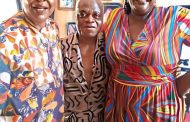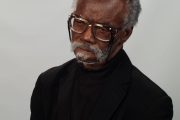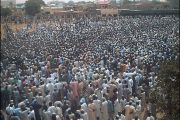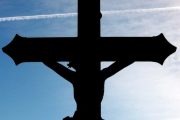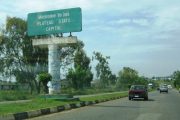In 1980 when the Kano State Government owned Triumph emerged on the streets of Nigeria, it did so as a rarity. A state government newspaper published from the geographical extreme of Northern Nigeria but also sought after in the Southernmost extremes of partisan Nigeria in the Second Republic could not but be so. Beyond the radical content for which it was sought was also the set of journalists who worked there. Not only did they come from every part of the country – Cross Rivers, Akwa Ibom, Sokoto, Plateau, Lagos, Kwara, Benue, Bauchi and so on, they were mostly also pocket ideologues of the radical tradition in Nigerian politics. Most had equally benefitted from the radical content on offer across Nigerian campuses at the time, particularly the famous Faculty of Arts and Social Sciences, (FASS) of the Ahmadu Bello University, Zaria.

A graphic of the late Rufa’i Ibrahim
The recruiters were Haroun Adamu who was the pioneer Managing Director and Rufai Ibrahim who served as the pioneer Editor of the weekly. To a great extent, each recruit somehow reflected the professional cum ideological outlook of those two within the wider context of the progressive politics of the People’s Redemption Party, (PRP). Aside from the editorial dare and the experimentation with difference and diversity, there was the dare in share of responsibility. Obviously to make a critical statement on gender, a lady, Alache Odeh, was made the Government House Correspondent in a Kano that people have no qualms describing as conservative in an unchanging sense. The Heavens did not fall.
Unfortunately, the comrades are not good in telling their stories. They share that weakness with their class opponents – the members of the power elite who can easily steal billions but will never seat down to write any account of what they tried to do with power. Only a few ones, particularly Chief Olusegun Obasanjo, are the exceptions here. A mandarin such as Adamu Ciroma even dismissed the idea of writing his biography because nobody, he said, would read it. But that was the man who criss-crossed journalism, finance, industry, party building and politics. How come it didn’t occur to Mallam that his biography would be the subject of PhD theses over and over across and beyond Nigeria such that he would even continue to exercise discursive power even from his grave? Sir Ahmadu Bello did that and his autobiography is part of the conversation as well as resolution of some of the thorny issues today. Subject to a refutation, it is not clear if Haroun Adamu or Rufai Ibrahim or any of Ismaila Mohammed, Sonni Anyang, Mustapha Ibrahim, Mohammed Sanni Zorro, Alache Odeh, Samson Namo, (now late) Umoru Ibrahim, amongst other warriors of journalism in early Triumph has put pen to paper.
The above context explains the big deal about the biographical text under reference. Dr. Ochapa Ogenyi, the subject of the biography, might not be a national big name player but his antecedent speaks to the story of Nigeria as it played out during the period under reference, meaning from the Second Republic in the 1980s till recently.
Typical of biographical works as both a methodology, a narrative and a research technique, this one too embody potentially controversial or contentious contents, depending on the reader, of course. Stripped to its essential, it is the story of journalism, the nomadic temptation that drives it and the pains and pleasures that comes with it. In this case, it is the story of a young Otukpo born Agila chap from the Idoma nationality in present day Benue State unfolding on Nigeria of the 1980, armed with a quality degree in Political Science from cosmopolitan Ahmadu Bello University, Zaria in those days when Walter Rodney’s How Europe Underdeveloped Africa had yet to be smashed by the World Bank across Nigerian universities.
Young people reading the biography will envy an Ochapa Ogenyi whose first shot in the world of work was as Assistant Secretary in the Cabinet Office in Government House, Makurdi. Why not? The quality of the undergraduate training they received then was such that he could be entrusted with state secrets without any risks. Even then, this young man was still not satisfied. The company of files marked ‘Secret’ all over the place and dead serious commissioners was not his cup of tea. He looked up to being a hard hitting reporter in The Triumph newspapers in Kano where many of his classmates were already enacting out their heroes in the profession such as Haroun Adamu, Dan Agbese, Sully Abu, Mohammed Haruna, Rufai Ibrahim. And there he went, emerging as the Benue State Editor of the newspaper subsequently. It did not take long before he crossed over to the Benue State Government owned The Voice but only to move again to Newswatch which was the acme of print journalism at a time in Nigeria. The testimonial for him there is being posted to the Dodan Barracks beat. That is not normally a position to which a flippant and disorganized reporter is sent. Then a return to The Voice as soon as the Catholic clergy, Moses Adasu, became the governor of Benue State in 1991 but this time as the Chief Executive, a job he no longer found doable as soon as the civilians were pushed away in late 1993 by General Sani Abacha. That was what took him back to where he had started – the civil service but, this time, at the Federal level.
In between these shifts are many interesting details a reader would find enriching and educative, depending on where s/he is entering the book from. What seems almost certain is the detaining power of the genealogical account which opens the book. The cultural and territorial profile of the same Idomaland we all think we know very well would fascinate almost all readers. The Igala trace in Idoma genealogy mentioned briefly on page 30 is another theme many others would find inviting, for instance. Or, the history of how the Apa-Agila settlement came to be as presented by the author. That is not to say that any reader would fail to notice the dosage of Agila essentialism pushed out by the young, lady author: dexterity, hard work, dependability and sense of brotherhood”. It is as if any other cultural identity would deny itself the prestige of these attributes. That profile is as interesting as it is an amusing component of the pack.

Dr. Ochapa Ogenyi
Ochapa Ogenyi: Portrait of an Administrator is not a biographical work but a cultural text. It is beyond Dr Ogenyi, the subject matter. If you want to refresh or know Otukpo town, especially its multi-cultural character, this book offers you something. If you want to get an insight into how World War 11 unfolded in what is Idomaland today, this biography has snippets for you. Those who seek a refresher course on what the intellectual diet was like at Ahmadu Bello University, Zaria during Dr. Ogenyi’s time there need this book. On page 122 is a reminder of what makes Aper Aku unforgettable in Benue State: 14 functional and relevant industries, excluding a state bank – Lobi Bank, three colleges of Education and a planned state owned university, all within just his first term. And then insights from the politics of the federal civil service which dominates the second part of the biography. And so on and so forth.
Chapters eight and nine bring a different flavour to the effort at account-giving. They show a Dr. Ogenyi confronting or responding to the typical elite’s challenge of religion and community service. Brought up on a diet of radical rejection of religion as but the opium of the people on the one hand and on the hope of enacting their communities along the radical imagination, they return mostly a pitiable lot on all counts to reconnect with religion and to the reality that change is elusive. In these two chapters, the reader comes face to face with an Ogenyi’s brave battles with these realities of elite life across Africa. Aluta continua, victory elusiveee!
Ochanya Ogenyi has scored a literary achievement with this work. Not only is it on ground, it can be improved upon towards a reworked edition. It is interesting to note that a recent graduate of a Nigerian university can accomplish this text. The decay has been such that this cannot be taken for granted.
Just 63 years old at a time 95 years old are still in power and when a 77 year old is just about mounting the American presidency, what does Dr Ochapa Ogenyi do in the next 30 or so years? The biographer herself wondered if her subject is returning to journalism or taking to academia or going into politics or contemplating gospel work or, going back to the roots to become the Ots’Apa – the stool his father was the first occupant in February 1993 upon his exit from politics after his return from the 2nd World War? It may be morning yet on creation day!





